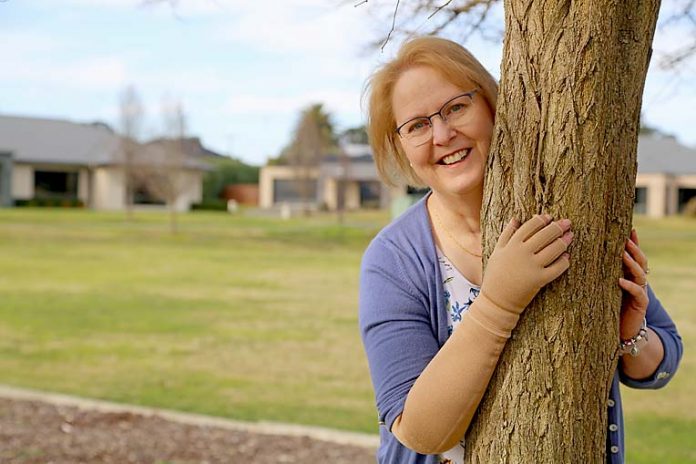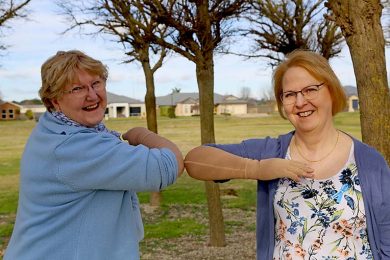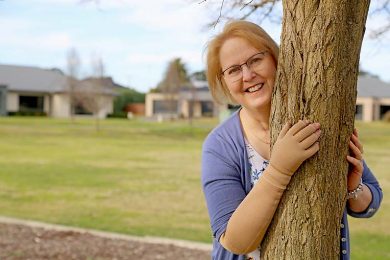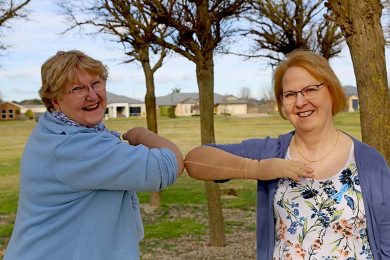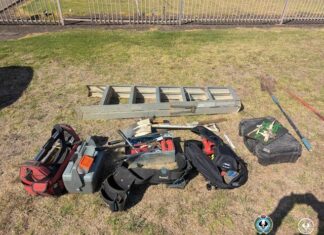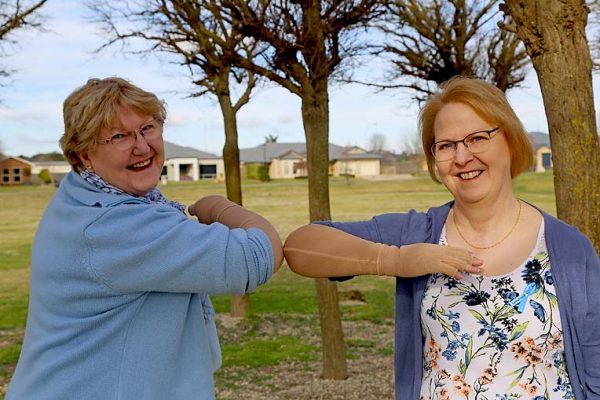
AFTER years of advocacy, Mount Gambier residents diagnosed with lymphoedema are celebrating a reprieve from the high costs of compression garments following the establishment of a state-based subsidy scheme.
Eligible South Australians will receive ongoing and sustainable access to receive up to two sets of ready-towear or custom made garments every six months under a joint Coalition and State Government funding contribution.
South Australia has been one of the only state’s in Australia without subsidised therapeutic compression garments for lymphoedema patients.
The Blue Lake city’s selfdescribed “lymphoedema ladies” Dulcie Hoggan and Cheryl Finch have praised both governments for establishing the long-awaited scheme, which they say will significantly ease the financial burden of purchasing the items.
“It costs $100 for one piece of my garment – the whole thing costs me $500 and I have three of them,” Ms Finch said.
“I am due for a replacement so this will help me a lot.
“I am lucky that I am in a financial position to be able to pay for the garments, but it is not the point and it is a lot of money.
“There are a lot of people who cannot afford it and either go without or buy cheaper garments, which causes more problems down the track.”
The chronic condition is characterised by swelling of certain parts of the body, usually a limb, caused by problems with the lymphatic system.
Ms Hoggan said while there was currently no cure for lymphoedema it could be managed with appropriate intervention, including prescribed compression garments.
“Lymphoedema is for life – because we can treat it, but there is no cure,” she said.
“That is why good compression garments are so important, because it helps the trapped fluid drain out of the area.
“If fluid gets trapped, it becomes toxic.
“I have had family members help me to buy the garments because they are so expensive, but it is necessary.
“It feels like a huge weight has been lifted off my shoulders.”
Lymphoedema Support Group of SA president Monique Bareham welcomed the win after almost a decade of lobbying.
“I cannot even describe what this means to lymphoedema patients in South Australia,” she said.
“This will change so many people’s lives and allow the right people to access the right bandages at the right time.”
Approximately 2300 South Australians living with lymphoedema, which is fluid retention and tissue swelling caused by a failure in the lymphatic system.
Cancer survivors are among the biggest cohort of lymphoedema patients, with a majority being breast cancer survivors.
Last year, independent MP Troy Bell successfully gained bipartisan support for the implementation of a lymphoedema compression garment subsidy scheme in parliament.
The long-time advocate said the implementation of the scheme was a tremendous win for people affected with lymphoedema across South Australia.
“My office first became involved in this issue two years ago, through passionate local women like Pam Moulden and Dulcie Hoggan, who have struggled with this condition for years,” Mr Bell said.
“Sadly, Pam is not with us anymore but her fight was not in vain and it was through her and Dulcie’s advocacy this scheme has come into effect.
“Lymphoedema hits you when you’re down, both physically and financially and the ongoing cost of compression garments is yet another thing to have to deal with.
“As the Member for Mount Gambier, one of the most satisfying parts of my job is taking on an issue on behalf of my community, fighting for it and achieving a positive outcome.
“I’m very pleased to deliver this for my community.”
South Australian Health Minister Stephen Wade said the garments could decrease the need for unnecessary admission for acute services for people living with lymphoedema.
“This will be tremendously beneficial for people who require these specialised compression garments to help manage their condition, enabling both greater independence at home and the ability to be an active part of the community,” he said.
The scheme is funded by South Australia’s Health and Wellbeing Department, with additional funds through an agreement with the Commonwealth.
“While at a Federal level the Morrison Government has been delivering funding through other States and Territories for some time, this new funding agreement with SA represents a significant step towards a nationally consistent approach to this important issue,” Member for Barker Tony Pasin said.

